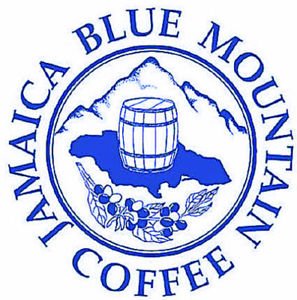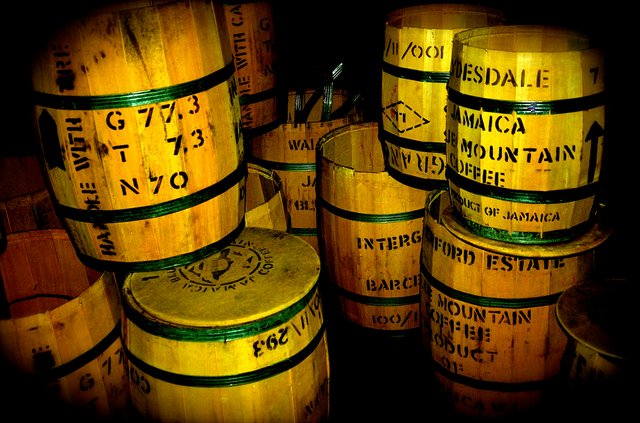The most famous one – Jamaica Blue Mountain
Jamaica Blue Mountain, the most famous of all single origin coffees and according to quite a lot of people, the best coffee there is. I for myself, I’m not an expert or cupper enough to be able to declare it’s the best coffee, but it sure is number 1 in a lot of people’s books. So it is interesting enough to take a closer look at.

The one and only official seal
First of all let’s look at the map and Blue Mountain’s geographic location and past. Jamaica lies in the Caribbean and is part of the Antilles. Those islands rose from the sea millions of years ago from volcanic activity, and even today there still are about 19 sleeping volcanos in the Antilles. The Blue Mountains are a mountain range on the island of Jamaica, with some of the highest mountains in the Caribbean, and they peak at 2,256 mts (Blue Mountain Peak). You could walk from Kingston, the capital at sea level, to the peak at just 16 km from the coast; but this sudden rise of course makes for some quite steep slopes (up to 70% at places).
When we start walking uphill you can see coffee farms everywhere, but (Arabica) coffee grown below 460 meters is not of the best quality and they call it Jamaica Supreme or Jamaica Low Mountain. When we come between 460 and 910 meters it is called Jamaica High Mountain, but it still is not what we are looking for. After that, but only until 1,700 meters, and being in one of the parishes of Saint Andrew, Saint Thomas, Portland or Saint Mary, coffee by law (The Coffee Industry Regulation Act) can be called Blue Mountain Coffee. Because of volcanic origins and the altitude we have a perfect combination for coffee growing and we now are where one of the best coffees of the world can be found. It would typically be a misty day with a high probability of some rainfall.
After we pass the 1,700 meters mark, you will not see any coffee anymore because all land above this level is declared to be forest preserve. Our visit should of course include the appreciation of the local flora and fauna, it would be worth it. Once at the peak, temperature would have fallen from around 27 at sea level to 5 degrees Celsius and you could see the coast lines of the island from the top. On a clear day you could even see Cuba at the horizon (210 km away).
A pound of Jamaica Blue Mountain coffee costs about 90 to 100 US$. That is quite a sum for one pound of coffee, so you would expect something quite special for that price. And I would say that expectations will be met: it is an excellent hard bean, washed Arabica coffee: experts say that it has a mild flavor, smooth acidity and an aroma of sweet herbs and flowers, with overtones of nuts. The taste is “clean” and, what I personally like the most, with very little bitterness in the aftertaste.

Jamaica Blue Mountain Coffee is shipped in wooden barrels
So it is a good coffee, maybe even exceptionally good, but still, $100? Sellers argue that it is grown in a unique coffee-growing environment (I would say exceptional, but not unique), that picking is labor-intensive, there is a strict quality control, 100% wet-milled, hand sorted and sun-dried etcetera, but that goes for a lot of good Arabica coffees. However, the main reason it is so expensive is because it is well-known and SCARCE. The Blue Mountains coffee-growing region in Jamaica is very small. Currently, they are producing just between 4 and 5 million pounds a year and not all coffee is classified as true Blue Mountain. Moreover, of that production about 80% goes to Japan and some goes into the coffee liquor Tia Maria, so that does not leave a lot for us in the rest of the world.
As it is scarce and expensive, there are a lot of scammers taking advantage of potential buyers, even in Jamaica itself. So when you have decided to buy this really special coffee, I would advise three things.
I can recommend buying from the Volcanica Coffee Company or BlueMountainCoffee.com. These are authorized and internationally renowned sources. And, of course they roast your coffee after your order it, so it will be fresh!
You should always look for the Certification Mark, the Coffee Industry Board seal (see above), because it is an internationally protected brand.
And lastly, you should read the packaging: it should say that it was grown, roasted, and packaged in Jamaica. If any process was done in a different country, it is a fake.
Previous article from coffee series you can find under tag #cafescope.
You can see them all here.
Article was also published on Cafescope